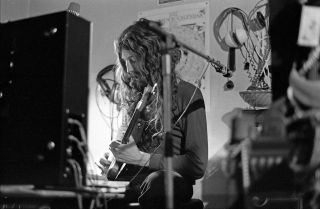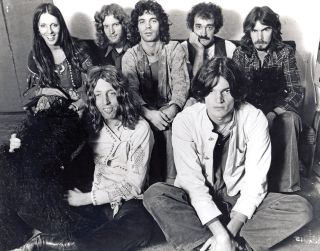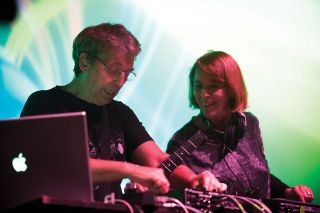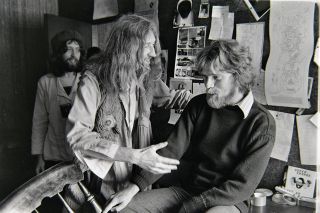When Prog catches up with Steve Hillage he is in a very good mood, having finally got his hands on the finished artwork for Searching For The Spark 1969-1991. This 22-disc boxed set collects his official studio and live releases, as well as copious demos, outtakes and other sonic artefacts and curios, many of which are previously unreleased.
Representing the most comprehensive collection of his work gathered together in one place, complete with a 188-page book, it is without doubt the Holy Grail for Hillage fans. “It looks absolutely great,” laughs the guitarist, with more than a hint of parental pride in his voice.
Several times during our conversation, Hillage sounds slightly surprised at the sheer variety of musical settings he found himself exploring for over five decades as a professional player. Rising to prominence with Gong, he shaped much of the musical direction on the Radio Gnome trilogy, all now widely regarded as classics. As he turned in his echo-infused cosmic spiral soloing, his beatific grin became as much a part of the group’s visual identity as Daevid Allen’s Pot Head Pixies. Though his 1975 solo debut Fish Rising was recorded while he was still in Gong, it was with 1976’s L that he stepped into the spotlight as a solo artist. “It was a whole new episode for me. I wasn’t consciously trying to make it not sound like Gong – I was just running with the ball basically.”
Hillage seems to relish challenging expectations. He once played with Sham 69 at Reading Festival, and as a successful record producer during the 1980s, he worked with artists as diverse as Simple Minds, Murray Head, Tony Banks, Carte de Séjour and Rachid Taha. Along with his creative and life partner Miquette Giraudy, in the 1990s he reinvented himself as pioneering dance outfit System 7, with whom he enjoyed numerous collaborations with Alex Patterson, Paul Oakenfold and other dance scene luminaries. Given Hillage’s ability to see beyond generic confines, it’s not surprising that he earned the Visionary Award at 2013’s Progressive Music Awards.
“It’s not like there was ever a grand plan,” he explains. “I just went with the things I was interested in.”
The new boxed set includes demos from your earliest recordings as well as outtakes and so on. Was it daunting having to sort through all that material?
Oh, I didn’t mind it actually. I spent a long time going through my dog-eared tapes and we came up with some really good stuff. I’m really happy with it. The initial reaction of some people online when we announced the price was, “How can they expect us to pay that much for all these records that we’ve already got?” But I actually think we’ve got it pitched pretty good. The thing that took a lot of time was creating a good balance with the unreleased material. So I’ve got a nice spread through the whole period, and not over-focusing on any one particular time.
You didn’t feel you were too close to your own music?
That’s where Jonny Green (Hillage and Gong expert) was so important in the whole process. He was like my editor. I couldn’t have done without him. There were quite a few situations where Jonny was adamant that I had to include a particular thing that I wasn’t necessarily so keen on or sure about. We had some creative debates and discussions about those kinds of issues, which all helped produce something that was a nicely balanced result.
Going back to the very start, back when you were a kid, you originally played piano but then switched to guitar. What was the attraction?
I really don’t know. I just loved it. I used to hear things like Lonnie Donegan on Children’s Favourites on the radio. I loved that jangly, strummy thing. Then it was The Shadows and I was like, “I want to do this.” I can’t say why. I really badgered and bothered my parents about it so they got me a little cheap guitar to shut me up. Which I did because I’d go away in my room to practise. It did shut me up. It was a good move.
Was it a happy childhood?
I’m sure I had my own share of early childhood and teenage angst. There was a period where I had to spend a lot of time on my own because there were various family crises and that was a very key moment for me. I found that I was okay on my own. I didn’t get particularly lonely and I think that’s where my creative muse started to operate. It was actually a tough time for the family, a very tough time for my parents. I was a bit young to fully appreciate what was going on but there were a lot of problems. It’s one of those instances though where you can apply a quote from the great Fela Kuti: “Even the bad can be good.”
They say practicing an instrument allows you to find out a lot about yourself as a person.
I wasn’t thinking at the time but I did have a very strong drive to get good on the guitar. By the time I was 13, I thought, “Wow, I can do this quite well!” So it developed my confidence.

Was growing up in London in the 1960s a special time for you?
Well, at school, my buddies Dave Stewart and Mont Campbell and me became quite obsessive visitors to live gigs. We went a lot. We were in a school in central London and so going to somewhere like The Marquee Club after school was not difficult. The first time I saw Jimi Hendrix was at The Marquee Club. I was six foot away from him and it absolutely, totally blew me away. I’d already seen Eric Clapton and Jeff Beck and other great guitarists, but this was just, “Oh my God!” What was happening with Hendrix, it wasn’t just what he played with his guitar and his fingers. There was some kind of cosmic wind coming through him. I learnt something about the power of music right there; the power of music as a form of energy transmission. It blitzed me for life. I’ve said this on many occasions. I saw Hendrix five times in total but obviously seeing him at somewhere like The Marquee Club, where I saw him twice, that was the key moment for me.
You were only 18 years old when you went into a recording studio, weren’t you?
That was the Arzachel album in 1969. What happened was we [Dave Stewart, Mont Campbell and Clive Brooks] developed our band Uriel when we were still at school. We got pretty good and started getting a lot of gigs. Mont and Dave really wanted to leave the school and do it professionally there and then. I didn’t feel I was in a position to do that for various reasons, partly connected with the relationship with my parents and the fact that they really wanted me to go to university in Canterbury.
You felt obligated to them to stay on?
Yeah, I did. It just wasn’t possible for me to jack everything in and do the band professionally, so I left. I remained friends with the guys in Uriel though, guesting with them at gigs. Then one day they called me up and said, “Hey, there’s this guy that wants us to do an off-the-shelf psychedelic album. We’re going to do it under assumed names. Are you up for it?” I thought it would be great and give me experience of a day in the studio. We concocted a few tunes, went in and did it.

For a lot of people at that time, recording a first album would’ve been a big thing.
Yeah, but we didn’t consider it a particularly big deal at the time. It was something we did for fun. I think that throwaway aspect gave us a lot of freedom and confidence. We weren’t like, “Oh God, this is our big chance,” y’know? We didn’t really give a toss. Obviously we wanted to play stuff we liked, and we did!
Subsequently, a couple of years later, when I decided to leave university and got Khan together, that was more serious. Recording the Space Shanty [1972] album was a bit more stressful. That was for real. I think that’s why I stopped Khan Mk.II – which was a pity because it was sounding great.
A lot of the tunes I got together for Khan Mk.II ended up on Fish Rising. I just felt it was going nowhere at the time and it started being stress city for me. I was only just 21 and I thought, “I just can’t handle this.” I thought, “I’ve got to play with some other bands for a while and get back to something of my own a bit later,” which is eventually what I did.
You once had to stand in for Mike Oldfield when Tubular Bells was performed at the Royal Albert Hall in December 1974. How stressful was that? I’d been in the Melkweg in Amsterdam with Gong the night before, stoned out of my head. I don’t know how I did that. A true miracle.
What did your parents make of you appearing at the Royal Albert Hall with an orchestra?
They loved that. I think that was what drove me to do it well. They were very happy about that.
How do you think they viewed your work with Gong?
They liked Gong, actually. My mother was always friendly with Daevid Allen and met him loads of times. She used to say, “I like that Daevid Allen, he’s a very funny man.” They came to quite a few Gong gigs and invited the band to dinner once. Lamb and mint sauce. I don’t know whether that appealed to all the vegetarians in the band [laughs]. It happened in Loughton in Essex. Strange things do happen!
You were only in Gong for a relatively short time in your overall career.
It might have been a short time but it felt like an eternity!
How do you look back on that time and albums like Angel’s Egg and You?
It was a strange and amazing experience. It was completely exhilarating, sometimes exasperating. The band that made Angel’s Egg [1973] and You [1974], I’d say it was the best band I’ve ever been in. Ever. Why? Because it was seven strong individuals, all good at what they did making the whole greater than the sum of the parts.
What stands out for you from Angel’s Egg?
There are many good bits. I think I’d have to say Other Side Of The Sky. That was all one take and us playing live. It was just, you know… wow. In terms of my own playing I’d say there were two pieces actually: the guitar solo on I Never Glid Before and the solo track I did, Castle In The Clouds. In particular that one because that was a launch pad for my whole subsequent development in the world of ambient music. Hats off to Daevid because he put together the order of the tracks and wove the story around it all.
- Steve Hillage On Gong, Mike Oldfield And His Early Solo Career
- Buyer's Guide: Steve Hillage
- Steve Hillage Discusses His New Searching For The Spark Box Set
- Steve Hillage - Searching For The Spark album review
After Gong, were you surprised at the way your solo career took off with the L album?
I thought L was going to do alright, although I couldn’t quantify what ‘alright’ meant. Then we got the Hyde Park thing, which was another thing that fell out of the blue. Our first gig in front of thousands of people. Fucking hell! That was a real baptism by fire. It really seriously disturbed me, actually. I felt really weird singing my songs about peace and love and there’s fighting in front of me. I tried to berate them over the mic and in the end I just thought, “Fuck it, let’s just finish the set.” We managed to get through the set and it seemed to go down pretty well.
It was a mad experience but it was very good in terms of timing for the release of the album and that helped enormously. It took off from there.
There’s always been an uplifting quality within your music. Was that deliberate, something you consciously worked at?
It’s not something you can necessarily work at with a technique, but obviously the whole aim of the game was to create what we might call an enhanced experience for the listener. If that’s what you get then we’re happy. It means it’s working. It’s a bit like the modern equivalent of shamanism. When you attune yourself to a certain energy and channel it through what you do with your music – it’s that. Most artists do this, though not all do it consciously. It’s part of art, really.
You’re talking about that moment where music lifts up somewhere else?
Yes. If you’re making music and you appreciate that aspect of the musical experience, you try to maximise it if you can. We found certain ways we could achieve that. We’re still very much of that orientation in what we do now, although it’s more instrumental-based and more connected to ambient and dance music. We haven’t lost that hunger to go for that aspect.
Has there always been a connection between your music and heightened, euphoric states, such as one often encounters at dance gigs?
Yes. That’s very much what led us into the whole dance thing. To a certain extent the dance thing grew up around us. At the end of the 80s we found that to be our musical home. But we never rejected what we’d done before. It was just part of a chronological progression. On the tour we did for Green in 1978, and the first year we played at Deeply Vale, we had a very interesting experience at a gig in Plymouth. Before we played there was a disco and the DJ had a pre-release copy of Kraftwerk’s The Man-Machine. The audience loved it, they were dancing away. Miquette and I were kind of gobsmacked.
We tend to associate German psychedelic music, or Krautrock as it was spoken of at the time, with sitting down cross-legged with a big, conical joint. But dancing to it hadn’t really occurred to us. Miquette and I looked at each and said, “My God, it’s the future! This stuff’s going to be massive.”
We had a kind of ‘eureka!’ moment in 1978. We didn’t know what to do with it at that time, but that’s when we had it.

What’s the secret of success between you and Miquette?
If we were ever to reflect on that, I think we’d say we’re very opposite. I’m English, she’s French. She’s female, I’m male [laughs]. She’s Aquarius, I’m Leo – opposite signs of the Zodiac. We find that we entertain each other. We enjoy doing things together and we’re quite lucky really. When we met in the early 70s it just clicked and it still does.
Were you surprised at the way the dance and ambient chillout scene adopted and adapted Rainbow Dome Musick?
When we did Rainbow Dome Musick in 1979, for us it was a very unique and special project uniquely for that event. We thought it was good and we were very happy with it, but we had no real prediction of how it would be viewed 10 or 20 years later.
Posterity isn’t something you’re thinking about when you’re making an album.
Not at all. One of my aphorisms is you’re only as good as your last gig or your last album or track or mix or whatever. You’ve got to focus on what you’re doing at the time.

What would you regard as the really pivotal album for you?
Motivation Radio [1977] because that’s where I did a left turn. All the pressure was on me to do another more obviously proggy album like L [1976] but I didn’t want to do that. I wanted to move in more of a funk direction with more electronics. I found Malcolm Cecil, the perfect producer for that. It didn’t do at all well in America but it definitely changed things for me.
Are there any of your releases you feel are underrated or haven’t quite got the attention you think they deserve?
It’s very difficult to answer that. They’re all steps along the way. I met Steven Wilson recently and one of his favourite albums of mine is For To Next [1983]. Maybe the sound is a little harsh, but I’m really pleased with the songs and the lyrics on that one. Some of them are a little dark but they say the same sort of thing as my earlier records but in a much more subtle way. I was writing this stuff at the time of the Falklands War and that had a bad effect on me – all that patriotism. I thought, “This is the pits!” So I was seeing things in a somewhat darker way, although my idealism was undimmed.
What’s your take on the Brexit referendum earlier this year, and the decision to take the UK out of the European Union?
It’s insane. There’s not one good thing you can say about Brexit. Not one thing at all. It’s wrong, sez me! Miquette’s French and I’m English. We’re European! I don’t want that part of my identity robbed from me. It won’t be. I’m not going to change.
You recently turned 65 years old, officially becoming an old-age pensioner. If you could go back and speak to your younger self, about to embark on a career as a professional musician, what would you tell him?
I’ll answer that with something Daevid Allen told me. Soft Machine had the same management as Jimi Hendrix and one day, Daevid was in the toilet with him at the Speakeasy club. Jimi looked at Daevid and he said, “Hey man, stay with your thing, stay with your thing.” So that’s what I’d say to myself: “Stay with your thing!”
Searching For The Spark 1969-1991 is out now on Madfish. See www.burningshed.com for more.


